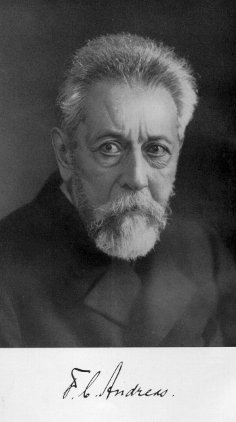1. Overview
Friedrich Carl Andreas (1846-1930) was a prominent German orientalist and linguist known for his extensive contributions to the study of Iranian languages and Oriental studies. Born in Batavia to parents of German, Malay, and Armenian descent, Andreas became a distinguished scholar with a remarkable proficiency in numerous languages. His academic career spanned lecturing in Berlin and a professorship at the University of Göttingen, where he specialized in deciphering ancient manuscripts. A key aspect of his work involved documenting a wide array of languages, notably through his involvement with the Royal Prussian Phonographic Commission during World War I, underscoring his dedication to broad linguistic understanding and preservation.

2. Life
Friedrich Carl Andreas's life was marked by extensive academic pursuits and significant field research that shaped his contributions to Oriental studies and linguistics.
2.1. Early Life and Education
Friedrich Carl Andreas was born on 14 April 1846 in Batavia, which was then part of the Dutch East Indies (modern-day Indonesia). His parentage was diverse, with roots in German, Malay, and Armenian heritage; he was a descendant of the historical Bagratuni dynasty (ԲագրատունիBagratuniArmenian). Andreas pursued his higher education in Germany, where he specialized in Iranian and other Oriental studies at various universities. His academic journey culminated in 1868 when he received his doctorate from the University of Erlangen after submitting a thesis focused on the Pahlavi language. Following his graduation, he continued his dedicated research into Pahlavi in Copenhagen, further deepening his expertise in this ancient language.
2.2. Early Career and Field Research
After completing his doctoral studies, Andreas embarked on several years of significant field studies starting in 1875. These extensive expeditions took him to Persia and India, regions crucial for his research into Iranian languages and cultures. During his time in these countries, in addition to his scholarly pursuits, Andreas also took on the role of a postmaster, which likely provided him with unique insights into the local communities and linguistic environments.
3. Academic Career
Andreas's academic career demonstrated a progressive engagement with the study of Oriental languages, culminating in a distinguished professorship.
3.1. Lecturing in Berlin
From 1883 until 1903, Friedrich Carl Andreas resided in Berlin, where he worked as a private tutor. During this period, he provided instruction in both the Turkish and Persian languages, demonstrating his practical application of linguistic knowledge outside of formal university settings.
3.2. Professorship at Göttingen University
In 1903, Andreas accepted a prestigious appointment as a professor of Iranian philology at the University of Göttingen. This role marked a significant milestone in his academic career, where he continued to conduct vital research. A primary task assigned to him at Göttingen was the meticulous deciphering of numerous manuscript fragments. These fragments had been collected during the German Turfan expeditions in Western China, and Andreas's expertise was crucial in interpreting these historically significant texts. His research on these "Turfan fragments" was facilitated by a collection of photographs provided to him from Berlin.
4. Scholarship and Contributions
Friedrich Carl Andreas was renowned for his profound scholarship, exceptional linguistic capabilities, and lasting contributions to Oriental studies, particularly in documenting diverse languages.
4.1. Linguistic Expertise and Scope
Andreas's primary research focus was on the comprehensive development of Iranian languages, tracing their evolution from antiquity to the contemporary period. His exceptional linguistic proficiency extended to a wide array of languages, including Afghan, Balochi, Ossetian, and Kurdish languages. Beyond Iranian tongues, he was also thoroughly conversant in Sanskrit, Hindustani, Arabic, Aramaic, Hebrew, Armenian, and Turkish. Andreas was widely acknowledged as an outstanding decipherer of both manuscripts and inscriptions, a skill that significantly aided his work on ancient texts. Although he was not a prolific author of books, he preferred to disseminate his vast knowledge through oral instruction and direct engagement with his students and colleagues, fostering a close-knit academic environment.
4.2. Royal Prussian Phonographic Commission
Due to his extraordinary linguistic talents and extensive knowledge of various languages, Friedrich Carl Andreas was appointed to the "Königlich Preußische Phonographische Kommission" (Royal Prussian Phonographic Commission). This commission was established with the crucial purpose of recording approximately 250 languages spoken by prisoners held in German World War I prisoner-of-war camps. Andreas's involvement in this initiative underscores his significant role in the scientific documentation of linguistic diversity, providing invaluable data for future research on less commonly studied languages.
4.3. Contributions to Avesta Studies
Among his specific academic achievements, Andreas made significant contributions related to the Avesta tradition, an ancient Iranian collection of religious texts. His work in this area involved deep insights into the linguistic and cultural aspects of ancient Iran, solidifying his reputation within the field of historical linguistics and religious studies.
5. Personal Life
Beyond his professional endeavors, Andreas's personal life included a notable marriage.
5.1. Marriage
Friedrich Carl Andreas was married to Lou Andreas-Salomé, a prominent figure known as a writer, essayist, and one of the first female psychoanalysts. Their marriage took place in 1887.
6. Death
Friedrich Carl Andreas passed away on 4 October 1930 in Göttingen, Germany.
7. Legacy and Assessment
Friedrich Carl Andreas's work profoundly influenced subsequent generations of scholars in Iranian studies and linguistics. His meticulous deciphering of ancient texts, coupled with his expansive linguistic knowledge, laid critical groundwork for understanding the historical development of numerous languages. His active role in the Royal Prussian Phonographic Commission further highlights his enduring legacy in the documentation and preservation of global linguistic heritage, establishing him as a scholar dedicated to both depth of specialization and the breadth of human language.